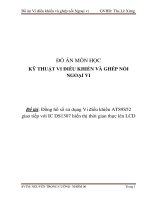Code giao tiếp msp430g2553 và module thời gian thực bq32000 hiển thị lcd
Bạn đang xem bản rút gọn của tài liệu. Xem và tải ngay bản đầy đủ của tài liệu tại đây (64.82 KB, 40 trang )
CODE GIAO TIẾP MSP430G2553 VÀ MODULE THỜI GIAN THỰC
BQ32000 HIỂN THỊ LCD
NGUYỄN BỈNH NHÂN
0798186889
/>1. File main. Giao tiếp LCD đã tích hợp vào trong hàm main lun
nha…
//-----------------------------------------------------------------------------//KHAI BAO THU VIEN
#include "msp430g2553.h"
#include "intrinsics.h"
#include "string.h"
#include "stdio.h"
//-----------------------------------------------------------------------------union reg {
struct bit {
unsigned char b0:1;
unsigned char b1:1;
unsigned char b2:1;
unsigned char b3:1;
unsigned char b4:1;
unsigned char b5:1;
unsigned char b6:1;
unsigned char b7:1;
}_BIT;
unsigned char _BYTE;
};
union reg* P2_DIR=(union reg*)0x2a; //khai bao dia chi o nho
union reg* P2_OUT=(union reg*)0x29;
union reg* P2_SEL=(union reg*)0x2e;
union reg* P2_IN=(union reg*)0x28;
union reg* P1_SEL=(union reg*)0x26;
union reg* P1_DIR=(union reg*)0x22; //khai bao dia chi o nho
union reg* P1_OUT=(union reg*)0x21;
union reg* P1_IN=(union reg*)0x20;
//
========================================
========================================
======================================
//KHAI BAO BIEN RTC:
int sec=00,min=00,hour=00,set=0, sophut=0, sogio=0,
sogio1=0, sophut1=0, sogio2=0, sophut2=0, min_caidat=0,
dem=0, temp_caidat_max=0, temp_caidat_min, humi_caidat=0;
unsigned char calen[]={'H','B','T','N','S','B','C'};
unsigned char CH_T1[4], CH_T2[4];
//
========================================
======================================
//DINH NGHIA GIAO TIEP DHT11:
//===dinh nghia chan cho DHT11====:
#define DHT_IN (P1_IN->_BIT.b7)
#define DHT_OUT (P1_OUT->_BIT.b7)
#define DHT_DIR (P1_DIR->_BIT.b7)
//================================
//BIEN DHT11:
unsigned char nhietdo, doam;
//
========================================
======================================
//DINH NGHIA LCD:
#define MCLK_F 1 // frequency of Master Clock in MHz
/
*****************************************************
***********************
* HARD DEFINITIONS
*****************************************************
*************************/
/* Display ON/OFF Control definitions */
#define DON
0x0F /* Display on
*/
#define DOFF
0x0B /* Display off
#define CURSOR_ON
0x0F /* Cursor on
#define CURSOR_OFF 0x0D /* Cursor off
#define BLINK_ON
#define BLINK_OFF
0x0F /* Cursor Blink
*/
*/
*/
*/
0x0E /* Cursor No Blink */
/* Cursor or Display Shift definitions */
#define SHIFT_CUR_LEFT
#define SHIFT_CUR_RIGHT
#define SHIFT_DISP_LEFT
0x04 /* Cursor shifts to the left */
0x05 /* Cursor shifts to the right
*/
0x06 /* Display shifts to the left */
#define SHIFT_DISP_RIGHT 0x07 /* Display shifts to the right
*/
/* Function Set definitions */
#define FOUR_BIT
0x2C /* 4-bit Interface
*/
#define EIGHT_BIT 0x3C /* 8-bit Interface
*/
#define LINE_5X7
0x30 /* 5x7 characters, single line */
#define LINE_5X10 0x34 /* 5x10 characters
*/
#define LINES_5X7 0x38 /* 5x7 characters, multiple line */
//
========================================
======================
// Your YM1602C 16x2 must be supplied with a voltage between
4.5V-5.5V
// However, signal pins can understand 3.3V logic level from
MSP430 as '1'
// Check your hardware connecting and map it to these
definitions below
// Map: LCD PIN <-> Output_Port _ out/dir -> Output_Pin
#define LCD_RS
#define LCD_RS_DIR
#define LCD_EN
#define LCD_EN_DIR
P1_OUT -> _BIT.b0
P1_DIR -> _BIT.b0
P1_OUT -> _BIT.b1
P1_DIR -> _BIT.b1
// This driver just help you to "write" LCD, not to read LCD
"status".
// So that, you must pull your pin LCD_RW to GND (0V).
#define LCD_DATA_4
P1_OUT -> _BIT.b2
#define LCD_DATA_4_DIR P1_DIR -> _BIT.b2
#define LCD_DATA_5
P1_OUT -> _BIT.b3
#define LCD_DATA_5_DIR P1_DIR -> _BIT.b3
#define LCD_DATA_6
P1_OUT -> _BIT.b4
#define LCD_DATA_6_DIR P1_DIR -> _BIT.b4
#define LCD_DATA_7
P1_OUT -> _BIT.b5
#define LCD_DATA_7_DIR P1_DIR-> _BIT.b5
//
========================================
============
/*or another PINS MAPPING TABLE:
#define LCD_RS
P2_out -> _bit.b1
#define LCD_RS_DIR
#define LCD_EN
P2_dir -> _bit.b1
P2_out -> _bit.b2
#define LCD_EN_DIR
P2_dir -> _bit.b2
#define LCD_DATA_4
P2_out -> _bit.b4
#define LCD_DATA_4_DIR P2_dir -> _bit.b4
#define LCD_DATA_5
P2_out -> _bit.b5
#define LCD_DATA_5_DIR P2_dir -> _bit.b5
#define LCD_DATA_6
P1_out -> _bit.b6
#define LCD_DATA_6_DIR P1_dir -> _bit.b6
#define LCD_DATA_7
P1_out -> _bit.b7
#define LCD_DATA_7_DIR P1_dir -> _bit.b7
*/
/****************************************************
************************
* MODULE PRIVATE FUNCTIONS:
* void lcd_delay_us (unsigned long t);
* void lcd_delay_ms (unsigned long t);
* void lcd_put_byte(unsigned char rs, unsigned char data);
*
*****************************************************
*************************/
//
========================================
======================================
//DINH NGHIA I2C:
//I2C PIN CONFIG:
#define SCL
BIT1
#define SDA
BIT0 //
#define P2
P2IN //
#define SCL_1
#define SCL_0
P2OUT |= SCL //
P2OUT &= ~SCL //
#define SCLdir_1 P2DIR |= SCL //
#define SCLdir_0 P2DIR &= ~SCL //
#define SDA_1
#define SDA_0
P2OUT |= SDA //
P2OUT &= ~SDA //
#define SDAdir_1 P2DIR |= SDA //
#define SDAdir_0 P2DIR &= ~SDA //
//
========================================
======================================
//CHUONG TRINH DELAY:
void delay_ms(unsigned int ms){
while(ms--){
__delay_cycles(1000);
}
}
unsigned int value;
//================================
void lcd_delay_us (unsigned long t)
{
int i;
for (i = 0; i
}
void lcd_delay_ms (unsigned long t)
{
int i;
for (i = 0; i
}
//
========================================
======================================
//THU VIEN LCD 1602:
//
*****************************************************
************************
// Send a byte of data (rs == 1) or command (rs == 0) to LCD
//
*****************************************************
************************
void lcd_put_byte(unsigned char rs, unsigned char data)
{
LCD_RS = 0;
if(rs) LCD_RS = 1;
lcd_delay_us(20);
LCD_EN = 0;
// send the high nibble
if (data&BIT4) LCD_DATA_4 = 1;
else LCD_DATA_4 = 0;
if (data&BIT5) LCD_DATA_5 = 1;
else LCD_DATA_5 = 0;
if (data&BIT6) LCD_DATA_6 = 1;
else LCD_DATA_6 = 0;
if (data&BIT7) LCD_DATA_7 = 1;
else LCD_DATA_7 = 0;
lcd_delay_us(20);
LCD_EN = 1;
lcd_delay_us(20);
LCD_EN = 0;
// send the low nibble
if (data&BIT0) LCD_DATA_4 = 1;
else LCD_DATA_4 = 0;
if (data&BIT1) LCD_DATA_5 = 1;
else LCD_DATA_5 = 0;
if (data&BIT2) LCD_DATA_6 = 1;
else LCD_DATA_6 = 0;
if (data&BIT3) LCD_DATA_7 = 1;
else LCD_DATA_7 = 0;
lcd_delay_us(20);
LCD_EN = 1;
lcd_delay_us(20);
LCD_EN = 0;
}
/****************************************************
************************
* MODULE PUPLIC FUNCTIONS:
* void lcd_init(void)
* void lcd_clear(void)
* void lcd_gotoxy(unsigned char col, unsigned char row)
* void lcd_putc(char c)
* void lcd_puts(const char* s)
* void lcd_clr_puts (const char* s1 , const char* s2)
* void lcd_put_num (unsigned long val, char dec, unsigned char
neg)
*****************************************************
*************************/
//
*****************************************************
************************
// Initialization for LCD module
//
*****************************************************
************************
void lcd_init(void)
{
// Set all signal pins as output
LCD_RS_DIR = 1;
LCD_EN_DIR = 1;
LCD_DATA_4_DIR = 1;
LCD_DATA_5_DIR = 1;
LCD_DATA_6_DIR = 1;
LCD_DATA_7_DIR = 1;
LCD_RS = 0;
LCD_EN = 0;
lcd_delay_ms(200);
// delay for power on
// reset LCD
lcd_put_byte(0,0x30);
lcd_delay_ms(50);
lcd_put_byte(0,0x30);
lcd_delay_ms(50);
lcd_put_byte(0,0x32);
lcd_delay_ms(200);
lcd_delay_ms(2);
// delay for LCD reset
// wait for LCD
lcd_put_byte(0,FOUR_BIT & LINES_5X7);
type
lcd_delay_ms(2);
// wait for LCD
// Set LCD
lcd_put_byte(0,DOFF&CURSOR_OFF&BLINK_OFF);
display off
lcd_delay_ms(2);
// wait for LCD
lcd_put_byte(0,DON&CURSOR_OFF&BLINK_OFF);
display on
lcd_delay_ms(2);
//
//
// wait for LCD
lcd_put_byte(0,0x01);
// clear display and move
cursor to home
lcd_delay_ms(2);
// wait for LCD
lcd_put_byte(0,SHIFT_CUR_LEFT);
mode
lcd_delay_ms(2);
// cursor shift
// wait for LCD
lcd_put_byte(0,0x01);
// clear display and move
cursor to home
lcd_delay_ms(2);
// wait for LCD
}
//
*****************************************************
************************
// Clear the LCD
//
*****************************************************
************************
void lcd_clear(void)
{
lcd_put_byte(0,0x01);
lcd_delay_ms(2);
// display off
// wait for LCD
}
//
*****************************************************
************************
// Move the pointer of LCD to coordinate (column, row)
// Note that cursor is at (0,0) after reset of clear LCD
//
*****************************************************
************************
void lcd_gotoxy(unsigned char col, unsigned char row)
{
unsigned char address;
if(row!=0)
address=0x40;
else
address=0;
address += col;
lcd_put_byte(0,0x80|address);
lcd_delay_ms(2);
// wait for LCD
}
//
*****************************************************
************************
// Put a writable character on LCD
// If the character is '\f', clear the LCD
// If the character is '\n', move cursor to the second line
//
*****************************************************
************************
void lcd_putc(char c)
{
switch(c){
case '\f':
lcd_put_byte(0, 0x01);
lcd_delay_ms(2);
// wait for LCD
break;
case '\n':
lcd_gotoxy(0, 0x01);
break;
default:
lcd_put_byte(1, c);
lcd_delay_ms(2);
// wait for LCD
break;
}
}
//
*****************************************************
************************
// Put a string s[] on LCD.
// Please note that the string is ended with '/0' (or 0x00)
//
*****************************************************
************************
void lcd_puts(const char* s)
{
while(*s){
lcd_putc(*s++);
}
}
//
*****************************************************
************************
// Clear LCD. Put string s1[] on line 1 and string s2[] on line 2
//
*****************************************************
************************
void lcd_clr_puts (const char* s1 , const char* s2)
{
lcd_clear ();
lcd_puts (s1);
lcd_gotoxy (0,1);
lcd_puts (s2);
}
//
*****************************************************
************************
// Put a constant or a number stored in 'val' on LCD
// The number must be multiplied and convert in type "unsigned
long"
//
or "unsigned int"
// dec: amount of digits after '.'
// neg: sign of the number, neg = 0 if the number is positive
//
// Example 1: lcd_put_num(val, 3, 0); // val = 12345
//
will put "12.345" on the LCD
// Example 2: lcd_put_num(val, 6, 1); // val = 12345
//
will put "-0.012345" on the LCD
//
// Note: This function may contain some bugs. If you can detect
and fix them
//
, please contact me :d
//
*****************************************************
************************
void lcd_put_num (unsigned long val, char dec, unsigned char
neg)
{
char i, j, digit,k;
long total;
long temp;
for (i = 0, total = val; total > 0;i++) // count number
total /= 10;
total = i;
if (neg !=0 )
lcd_putc ('-');
if ((total - dec) <=0) // if total < dec put 0.xxx
lcd_putc('0');
else
{
for (i=0; i< (total-dec); i++)
{
temp = 1;
for (j=1;j<(total-i);j++)
temp *=10;
digit = (val/temp)%10;
lcd_putc(digit + 0x30);
}
}
if (dec > 0)
{
lcd_putc('.');
if ( (dec - total)> 0) // ex: val = 55; dec = 3 put 0.055
{
for ( i = 0; i < (dec-total);i++)
lcd_putc('0');
k = 0;
}
else
k = total - dec;
for (i=k; i< total; i++)
{
temp = 1;
for (j=1;j<(total-i);j++)
temp *=10;
digit = (val/temp)%10;
lcd_putc(digit + 0x30);
}
}
}
/
*****************************************************
*************************
* END OF LCD.C
*****************************************************
**************************/









